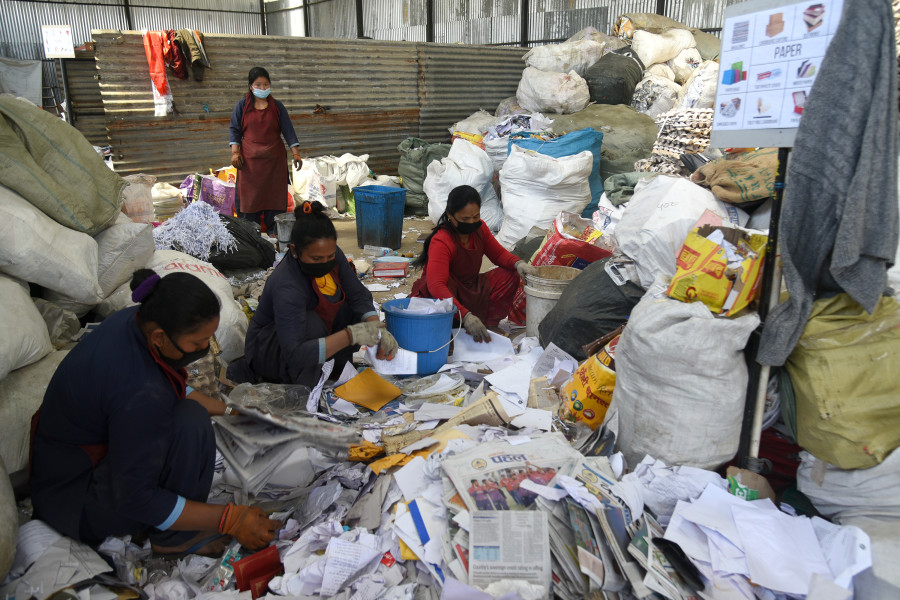Entertainment
The (re)cycle of waste
Every morning at nine, pick-up vans carrying dry waste make their way to an open space at Sano Thimi, Bhaktapur, to dump their collection for the day. Although the space is filled with mountains of solid waste, including paper products, metals, plastics, glass and e-waste, it is not a typical landfill site but rather a warehouse for Doko Recyclers, a private waste management startup.
Rose Singh
Every morning at nine, pick-up vans carrying dry waste make their way to an open space at Sano Thimi, Bhaktapur, to dump their collection for the day. Although the space is filled with mountains of solid waste, including paper products, metals, plastics, glass and e-waste, it is not a typical landfill site but rather a warehouse for Doko Recyclers, a private waste management startup.
The issue of solid waste management in Kathmandu Valley is a recurring crisis. The problem escalates every year, especially during monsoon when garbage collection gets affected, as the road condition to the Sisdole landfill site at Okharpauwa, Nuwakot, deteriorates. But with the Sisdole landfill site, which has been the only site for the Kathmandu Valley for last 12 years, reaching its maximum capacity, the problem of waste management is about to have a major crisis. In order to prevent this, it is imperative private companies get into waste recycling businesses.
With a team of 29 members, Doko Recyclers has been working towards preventing recyclable and reusable waste from ending up in the landfills. The company collects wastes from over 90 organisations and thousands households in the Valley.
“Without implementing source segregation of waste and proper collection mechanisms, waste issues cannot be solved,” says co-founder Raghavendra Mahato.
But it is not an easy task. The Doko team conscientiously separate papers and carefully pile them up according to their labels—newspaper, confidential documents, scraps. Similarly, they also segregate metals, plastics, glass and e-waste, getting them ready for recycling. According to them, Doko is dedicated to managing and recycling dry waste for a zero-waste future.
Khalisisi, another waste management company, has a similar goal but a rather different approach. Khalisisi, which translates to ‘empty bottles’ in Nepali, works by mobilising local scrap dealers, or “Khalisisi friends” as they call them. They urge households to segregate their trash at source, after which the Khalisisi friends collect it. Unlike Doko, where the company picks up the waste by themselves, Khalisisi has been mobilising scrap collectors, setting up an extra income platform for the informal sector, who otherwise live at the mercy of good sales.
“It’s a win-win for both households and scrap collectors. People can choose to donate or sell their dry waste while for our Khalisisi friends, this venture has increased their income by 32 percent monthly,” says Ayushi KC, founder and CEO of Khaalisisi.
Both Doko and Khaalisisi upcycle specific waste to create new marketable products. For instance, the Doko team upcycles broken chairs and
coloured glass bottles. Their upcycled innovative initiative—from trashed glass bottles to candle holders, glasses, lamps, kitchen range and home decor items—marketed under the brand name Tatwa.
Other products like shredded paper, plastics, scrap metals, and transparent glass bottles that cannot be upcycled are sold to recycling factories.

Similarly, Khaalisi has started with their venture of collecting worn out jeans and sarees to upcycle them to make marketable products such as bags, purses, and decor items.
“Each pair of jeans recycled prevents 1.25kgs of waste from being added to the landfill,” says KC.
Tyre Treasures and Dhaasoo are among few other companies upcycling solid waste. As their name suggests, Tyre Treasures collects worn out tyres from automobile workshops to make furniture and home decor items. Their initiative, they say, prevents discarded tyres from being burnt away in brick kilns.
Dhaasoo, on the other hand, manufactures decor items from coloured glass bottles combined with wooden handicrafts.
The scalability and potential of these budding waste management companies, however, still remains a matter of concern in light of a lack of advanced recycling technology and proper laws. These social ventures are not yet capable of recycling or upcycling waste on a large scale.
This results in the segregated waste making their final stop in Indian waste industry.
“Selling these waste to countries like India for recycling has no economic benefit to our country. The sales have a very low, to no, margin,” says Mahato from Doko Recyclers.
Apart from paper, metals, glass bottles, e-waste has also been a major concern for waste management. Every piece of electronics, whatever
its magnitude, has some environmental impact and if not segregated carefully, may lead to harmful consequences to the environment and humans.

The upcycled products from discarded glass bottles.
The amount of e-waste collected in Nepal has been growing in an alarming rate. According to the Department of Environment, 4,990,487 tonnes of mobile phones were discarded in 2016. Due to the unavailability of proper e-waste management techniques in Nepal, these hazardous products end up in the landfills.
“We received about 55 tonnes of e-waste over the last year. We repair the ones we can but most of them have lost its life and contain hazardous chemicals like mercury, cadmium and nickel,” Mahato says.
However, Doko has updated itself with innovations such as wire stripping machines, by which the usable rubber coating of wires are recycled and the inner copper wire is reused.
the waste management industry has grown to be a very raw and opportunistic approach to both business owners and preservation of environment. So far, in context of Nepal, we do not have many professional waste management service providers that focus on resource recovery rather than just provide logistical services, dumping all the waste through traditional means.
But there is still a long way to go for these waste management startups that have taken a more sustainable route.
“There are different problems every day, quality control is usually an issue as raw materials comes in different shapes and conditions, yet we try to make the best out of them. Amidst all this, we are also struggling to sustain the company and keep moving forward,” says Mahato.




 8.88°C Kathmandu
8.88°C Kathmandu










